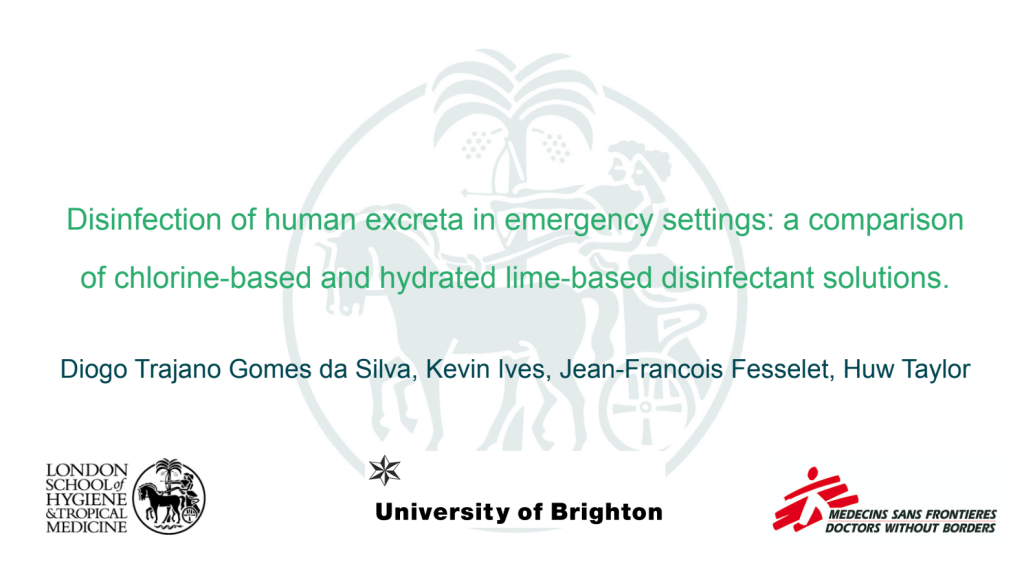Research
Disinfection of human excreta in emergency settings: a comparison of chlorine-based and hydrated lime-based disinfectant solutions
Author: Diogo Trajano Gomes da Silva, Kevin Ives, Jean-Francois Fesselet, Huw Taylor
Year: 2018
Publisher: London School of Hygiene & Tropical Medicine, University of Brighton, Medicines Sans Frontiers
Presentation at the Emergency Environmental Health Forum (EEHF) 2018 Diogo Trajano Gomes da Silva, Kevin Ives, Jean-Francois Fesselet and Huw Taylor.
Disinfection of human excreta in emergency settings: a comparison of chlorine-based and hydrated lime-based disinfectant solutions
Rating
Would you like to see other resources here?
Give us your feedback"*" indicates required fields
Related Resources and Tools
Lived experiences of residents in informal settlements regarding sanitation services
Video from the presentation at the Emergency Environmental Health Forum (EEHF) 2025 by Caroline Karani…
GHG emissions compared across faecal sludge treatment catchments in Cox's Bazar refugee camps
Video from the presentation at the Emergency Environmental Health Forum (EEHF) 2025 by Ibrahim Touray…
Urban sanitation and climate change: A public service at risk
The purpose of this document is to present findings from a landscape study on urban…
Non-negligible Greenhouse Gas Emissions From Non-sewered Sanitation Systems: A Meta-Analysis
Current methods for estimating sanitation emissions underestimate the significance of methane emissions from non-sewered sanitation…
Piloting Ecological Sanitation (EcoSan) in the Emergency Context of Port-au-Prince, Haiti, after the Earthquake
The earthquake that struck Haiti in January 2010 and the cholera epidemic that followed from…
SANIHUB Webinar: Lime Treatment of Faecal Sludge in Humanitarian Contexts
The session showcases emerging new findings from a project supported by Elrha’s Humanitarian Innovation Fund,…
Considerations for implementing sustainable faecal sludge services in humanitarian contexts
Video from the presentation at the Emergency Environmental Health Forum (EEHF) 2025 by Claire Papin…
Evaluating Solid Sludge Removal Technology for Rohingya Refugee Camp Latrines: A Case Study
Video from the presentation at the Emergency Environmental Health Forum (EEHF) 2025 by Md. Al…
FSM TWiG Session- Lessons learned from the Lebanon WASH Cluster
The Lebanon WASH cluster members jointly prepared the attached presentation for the FSM TWiG members…
Adapting Humanitarian Coordination – Challenges, Innovations, and Future Directions for NGO-led Mechanisms
The world is increasingly entering a period where conflict and climate related humanitarian emergencies are…
Safer faecal sludge management in emergencies: Lessons from Project SMaRT in and beyond Bangladesh
Video from the presentation at the Emergency Environmental Health Forum (EEHF) 2025 by Diogo Trajano…
Oxfam FSTP sludge related data
Deslduging printable, Intermediate FSTN printable, Oxfam FSTP sludge loading rate
Identifying Determinants To Sewer Connection Uptake Lusaka Zambia
Video from the presentation at the Emergency Environmental Health Forum (EEHF) 2023 by Jenala Chipungu…
Strengthening Gender Integration in Sanitation Programming and Policy: Insights From Literature and Practice
Gender equality and inclusion are key aspects of water, sanitation and hygiene (WASH) service provision…
Aerobic FSM package for deployment to acute emergencies
Poster from the Emergency Environmental Health Forum (EEHF) 2019 by William Carter, IRFC.
How WASH can contribute to peace- and state-building
This research looked at how (and how far) the delivery of Tearfund’s water, sanitation and…
To char or not to char? Review of technologies to produce solid fuels for resource recovery from faecal sludge
Lived experiences of residents in informal settlements regarding sanitation services
Video from the presentation at the Emergency Environmental Health Forum (EEHF) 2025 by Caroline Karani…
GHG emissions compared across faecal sludge treatment catchments in Cox's Bazar refugee camps
Video from the presentation at the Emergency Environmental Health Forum (EEHF) 2025 by Ibrahim Touray…
Urban sanitation and climate change: A public service at risk
The purpose of this document is to present findings from a landscape study on urban…
Non-negligible Greenhouse Gas Emissions From Non-sewered Sanitation Systems: A Meta-Analysis
Current methods for estimating sanitation emissions underestimate the significance of methane emissions from non-sewered sanitation…
Piloting Ecological Sanitation (EcoSan) in the Emergency Context of Port-au-Prince, Haiti, after the Earthquake
The earthquake that struck Haiti in January 2010 and the cholera epidemic that followed from…
SANIHUB Webinar: Lime Treatment of Faecal Sludge in Humanitarian Contexts
The session showcases emerging new findings from a project supported by Elrha’s Humanitarian Innovation Fund,…
Considerations for implementing sustainable faecal sludge services in humanitarian contexts
Video from the presentation at the Emergency Environmental Health Forum (EEHF) 2025 by Claire Papin…
Evaluating Solid Sludge Removal Technology for Rohingya Refugee Camp Latrines: A Case Study
Video from the presentation at the Emergency Environmental Health Forum (EEHF) 2025 by Md. Al…
FSM TWiG Session- Lessons learned from the Lebanon WASH Cluster
The Lebanon WASH cluster members jointly prepared the attached presentation for the FSM TWiG members…
Adapting Humanitarian Coordination – Challenges, Innovations, and Future Directions for NGO-led Mechanisms
The world is increasingly entering a period where conflict and climate related humanitarian emergencies are…
Safer faecal sludge management in emergencies: Lessons from Project SMaRT in and beyond Bangladesh
Video from the presentation at the Emergency Environmental Health Forum (EEHF) 2025 by Diogo Trajano…
Oxfam FSTP sludge related data
Deslduging printable, Intermediate FSTN printable, Oxfam FSTP sludge loading rate
Identifying Determinants To Sewer Connection Uptake Lusaka Zambia
Video from the presentation at the Emergency Environmental Health Forum (EEHF) 2023 by Jenala Chipungu…
Strengthening Gender Integration in Sanitation Programming and Policy: Insights From Literature and Practice
Gender equality and inclusion are key aspects of water, sanitation and hygiene (WASH) service provision…
Aerobic FSM package for deployment to acute emergencies
Poster from the Emergency Environmental Health Forum (EEHF) 2019 by William Carter, IRFC.
How WASH can contribute to peace- and state-building
This research looked at how (and how far) the delivery of Tearfund’s water, sanitation and…
To char or not to char? Review of technologies to produce solid fuels for resource recovery from faecal sludge
Still have questions?
You could not find the information you were looking for? Please contact our helpdesk team of experts for direct and individual support.


